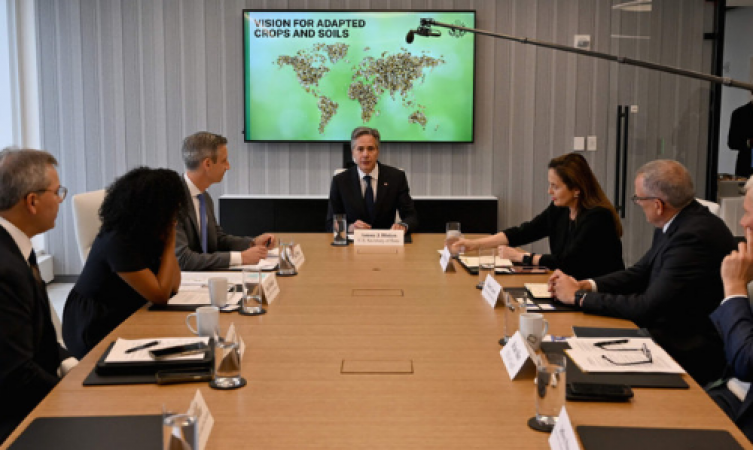
Washington: On Thursday, US Secretary of State Antony Blinken issued a challenge to all nations, urging them to tell Russia to stop using the grain from Ukraine and the Black Sea as "blackmail" and to stop using the world's hungry and defenceless citizens as bargaining chips in its "unconscionable war."
At a UN Security Council meeting, the United States' top diplomat slammed Russia for rejecting global pleas and abandoning the one-year-old agreement that permitted Ukraine to export more than 32 tonnes of grain from Black Sea ports to impoverished nations.
And how has Russia responded to the distress and outrage of the world? threatening to attack any ship in the Black Sea, mining port entrances and bombing grain silos in Ukraine," he said.
Also Read: 18 people are killed when a bus carrying Indians crashes into a ravine in Mexico
This month, Blinken presided over the United States' council presidency's signature event, which focused on conflict as a major cause of hunger and famine.
He declared that the United States, which has contributed more than $17.5 billion since January 2021 to address famine and food insecurity, will contribute an additional $362 million to address the root causes of hunger in Haiti and 11 African nations.
He cited the UN World Food Programme, which announced last week that it needs $20 billion to provide aid to everyone in need while aiming for between $10 billion and $14 billion, the amount it has received in recent years. WFP reported that it had only received about $5 billion so far this year, and as a result, 38 of the 86 countries where it operates have already reduced or are soon planning to reduce food assistance.
The cost of that shortfall, according to Blinken, "will be measured in lives lost and growth stunted."
Also Read: Escalating Tensions: Ukraine Strikes Russian Naval Base near Novorossiysk
The second-largest economic force in the world after the United States is China, which he also impliedly criticised in his statement: "The world's largest economies should be the world's largest donors, for member states to consider themselves global leaders. Here's your chance to demonstrate it.
Blinken continued, "All of us. We can all delve deeper.
The Security Council adopted a presidential statement at the beginning of the meeting, which was supported by all 15 members. It strongly denounced "the use of starvation of civilians as a method of warfare" and expressed concern over the increasing number of armed conflicts around the world.
The council added that in 2022, "armed conflict was the most significant driver of high levels of acute food insecurity for roughly 117 million people in 19 countries and territories," and that an estimated 148.1 million children under the age of five experience stunted growth as a result of malnutrition.
In a communique distributed to the 193 UN members, the United States asked for pledges "to take action to end the use of food as a weapon of war and the starvation of civilians as a tactic of warfare." 91 countries, or less than half the membership, according to Blinken, have signed.
The statement from the Security Council emphasised the need "to break the vicious cycle between armed conflict and food insecurity."
The International Rescue Committee's David Miliband reminded the council that although the organisation called for the breaking of that link five years ago, "there is more armed conflict, more famine, more malnutrition, and more and more food insecurity" today.
He claimed that the list of nations where conflict is causing hunger is the same in every assessment: Somalia, Afghanistan, Yemen, Nigeria, South Sudan, Sudan, Burkina Faso, Mali, and Haiti.
To help the 35 million people on the verge of starvation and the 375,000 people who would face famine-like conditions at the end of 2022, Miliband urged action rather than just saying more words.
He cited the fact that 80 percent of children who are severely underweight don't receive any treatment as an illustration of the disparity between approaches to moderate and severe malnutrition. According to him, diagnosing malnutrition can be done by wrapping a tape around a child's arm and measuring its circumference. Depending on how severe the case is, one or two doses of therapeutic food can then be given daily.
There are numerous international initiatives addressing famine and food insecurity, Miliband told the council. He advocated for the UN High Level Task Force on Preventing Famine, which will be led by Reena Ghelani, to serve as the single entity that will inspire collective action.
Ghelani emphasised the importance of international cooperation. She informed the council that after visiting far too many nutrition wards and camps for the displaced, the eerie silence of young children fighting for their lives but unable to cry because of malnutrition "never leaves you."
She added, "That silence is also a call to action." "Proceeding as usual won't work."
The agenda for the day-long council meeting included speakers from 80 different nations.
Dmitry Polyansky, Russia's deputy UN ambassador, argued that the Black Sea grain deal had turned commercial rather than humanitarian in response to criticism over its withdrawal. He claimed that the West was only interested in the issue of global hunger "insofar as they think they can attempt to exploit this topic to demonise Russia" and indulge their "pipe dreams" of defeating it in the Ukraine.
Also Read: West African bloc searches for a solution to the Niger coup as the deadline approaches
However, Polyansky left the door open for the Black Sea agreement to be resumed if the West ensures that Russian grain and fertiliser can reach underdeveloped nations "without hindrance."
After the meeting, Blinken told reporters that the US would "continue to do whatever is necessary to ensure that everyone can export their food and food products freely and safely, including Russia" if Russia returned to the agreement.
He stated, "We want to see that food on international markets. "We want the lower prices to benefit everyone,"